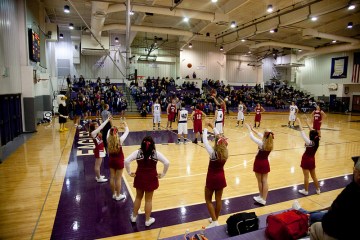More than a week after the Final Four that ended in Louisville’s championship, and all the bright drama—Ware’s gruesome fracture, Florida Gulf Coast’s unlikely success, the thrilling final game—has faded. In its place is a drabber appraisal of the tournament by the numbers. Once again, a one-seed finished first. None of the four games pitting a 16-seed against a one-seed ended in an upset. In fact, barring the play-in contests, no bottom-seed has ever won a game in the NCAA tournament.
And yet, this year as the others, the underdogs labored. They shrugged off the improbability of victory. They believed they could win and should win. And when they failed, they were devastated.
Though it takes place on a smaller stage, Medora, a new documentary from filmmakers Andrew Cohn and Davy Rothbart, is essentially the story of a 16-seed. The film is about the boy’s basketball team at Medora High School, one of the smaller, poorer rural high schools in Indiana. They routinely face off against schools with student bodies ten times larger than theirs. They haven’t won a game in years, because really, how could they? The numbers conspire against them. And yet, despite the fact that they are in the middle of a long losing streak, each time they lose, they are devastated. Players fight back tears, parents hang their heads, the coach fumes.
(More on Roads & Kingdoms: A Day in Damascus)
“Are you kidding me?!” stabs Justin Gilbert, a first-year coach from a family of basketball coaches, in the film’s opening scene. “You had no points. Zero. ZERO POINTS in the fourth quarter. Zero! None!” The boys just sit there red-eyed. They’ve failed themselves and their town.
It’s a slightly unsettling undercurrent throughout the movie: the people here often don’t like themselves. They have a vestigial pride in their town, but they don’t seem to like it on a daily basis. The brick plant has shut down, drugs have moved in, and the people of Medora feel the taunts from other, more fortunate parts of the county. But if the outside world is hard on Medora, they’re harder on themselves.
“It’s my fault, guys,” wails guard Corey Hanson, as another game slips away. He smacks his leg and buries his head in his hands.
“They can’t even guard the water boy, Bill. They’re letting anybody score!” says one of the play-by-play announcers. “Looks like it’s going to be another long season.”
And the kids beat themselves up in other ways. The star center gets arrested for underage drinking. In brief, intimate moments throughout the movie, the kids of Medora smoke, drink, stagger, dive off of Dumpsters. “Medora’s been in the gutter,” says freshman forward Chaz Cowles. “It’s hard.” Shortly thereafter, he stops showing up to practices and gets kicked off the team.
* * * *
This liturgy of losing is what John Branch, whose 2009 New York Times article inspired the filmmakers to make this movie, called the “anti-Hoosiers.” It’s a feel-bad story. And yet, it’s not nearly as oppressive for the viewer as it could be. The great feat of this movie is to get you to fall for these struggling kids. When they are unfair to themselves, you only crush harder.
That’s why I was sitting in a Medora screening, at noon on an otherwise chirpy day at SXSW in Austin, nearly weeping when the boys finally, as you felt they had to do all along, win a game. The movie handles the scene without much sentiment. There’s no orchestral swell. The fluorescent lights of the gym glare as much as always, and the boys don’t look so much emotional as dazed by their flash of good luck. But in the middle of the post-game scrum is a telling figure: Davy Rothbart, one of the film’s two co-directors, with camera, headphones and one of the biggest grins in the whole town.
(More on Roads & Kingdoms: The Best Ice Cream in Lahore)
“Davy rushed the court,” says Cohn, who was shooting from the stands, in a phone interview later. “I was, like, what are you doing dude, get out of the way!”
Neither Cohn nor Rothbart, the restless, confessional writer best known as co-creator of Found Magazine, hide their affection for their subjects. “It was hard for Andrew and I when we were filming the games,” says Rothbart. “I would have tears in my eyes when they lost a close one.”
The two filmmakers grew up together in Ann Arbor, Michigan, a bustling university hub a world apart from a town like Medora, and they weren’t immediately welcome when they arrived with their cameras. “[Medora’s] not the easiest community to become a part of,” says Rothbart. But they persisted, spending as much time as they could, staying in nearby Seymour, Ind., (“the closest town with WiFi), driving along the same stretch of highway that Seymour native John Mellencamp rode, in better days, in his video for “Hurts So Good.”
“We were just really consistent in coming. We were there every single day,” says Cohn. “Ultimately, when you show genuine kindness to people, they open up.”
* * * *
In a town that hates losing, it must have been difficult to set out to make a movie about a team that never wins. But the real bête noire of the movie isn’t the losing, or even the dreaded full-court press that unnerves Medora’s shy, wiry guards on the court. It’s the specter of school closure, a brutal process with a clinical name: consolidation. Throughout rural America, small-town schools are shuttered, the kids are bussed to consolidated schools, and eventually, the town left behind just stops breathing. “When that school goes, this town goes right behind it,” says a Medora resident while watching a meager town parade. “This town will die when that school leaves.”
(More on Roads & Kingdoms: A Day with Magicians in Ho Chi Minh City)
That’s just one way in which the story of Medora is a fine stand-in for issues far beyond basketball or brick plants. Rothbart says it’s about the beauty of striving for something you can never achieve. I think it’s something a little darker than that.
There’s nothing more American than the idea that you are the author of your own fate, in good times and bad. It’s not just the pundits and politicians who see poverty as a sort of personal failing; these kids who were born into a dying town also seem to believe the same. On the court and off, they don’t worry about how rigged the game is, they just play it fiercely. And when victory slips through their fingers yet again, they learn to blame themselves just a little bit more.



